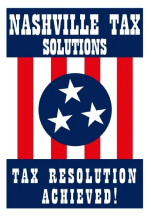Expert Advice, Proven Results
Stressing out with the unfilled IRS Tax Audit? Facing the risk of inaccuracies in tax returns can be overwhelming. Don’t let the legal issues of tax audits put you at risk. With over 20+ years of experience in auditing IRS taxes, Nashville Tax Solutions provides timely corrections and compliance, mitigating risks. Secure your future with our team now.
IRS Tax Audit
Expert Advice, Proven Results
What is an IRS Tax Audit?
An IRS audit is an examination of an individual's or organization's financial and accounting records to ensure compliance with tax laws and to verify the accuracy of the reported tax amount.
The IRS has broad criteria when choosing tax returns for audit. While a certain percentage is randomly assessed, the majority is chosen based on specific triggers.
High income, significant deductions that seem unusual, or inconsistencies with other filings can all raise red flags for the IRS's algorithms. Even a connection to someone else under audit might land your return under scrutiny. Understanding these triggers can help prepare for the possibility of an audit and ensure the return is accurate and well-documented way.
If you ever have to undergo an IRS tax audit, it's highly recommended that you seek assistance from a professional. A tax professional can provide you with IRS audit help, ensuring that your rights are protected, your tax information is presented accurately, and any interaction with the IRS is conducted in a way that aims to minimize any potential financial impact

Don't face it alone! Let our expertise lead the way to a favorable outcome
Choose Nashville Tax Solutions for exceptional IRS Tax Audit guidance. Secure your financial future – Act now!
How can Nashville Tax Solutions Help You?

Personalized Consultation

Understanding Your Needs

Audit Strategy

Documentation Review

Expert Guidance

Timely Response
Why Choose Our Expertise for Your Audit Resolution?
Experienced Professionals
Proven Track Record
Personalized Approach
Comprehensive Support
Timely Response
Efficient Resolution
Client-Centric Approach
Trusted Partner
Avoiding Future Audits: Strategies to Minimize the Risk of Future Audit
Understand Deductions
It is important to be aware that when filing taxes, overestimating the amount of deductions you are entitled to claim can increase the likelihood of being selected for an audit.
Report All Income
Small amounts of income can make a difference when it comes to taxes. The IRS has a matching system in place, which means it's crucial to make sure that all sources of income are accurately accounted for. By doing so, you can avoid any potential discrepancies and ensure that you're meeting your tax obligations.
Avoid Round Numbers
When you come across round numbers in deductions or expenses, it could suggest that the figures are not exact and may indicate estimates, leading to inaccuracies. Therefore, it's always advisable to double-check such figures to ensure they are precise.
Electronic Filing
E-filing is efficient and reduces the chances of mistakes that might lead to an audit.
Prepare for the Possibility
It is essential to take necessary precautions to avoid audits, but it's also crucial to be prepared if an audit does occur. You can do so by keeping well-maintained records and having a solid plan in place. This will not only help you navigate through the audit process with ease but also demonstrate to auditors that you are responsible and compliant.


